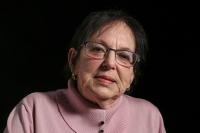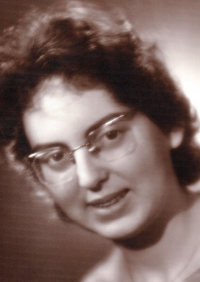I was always aware of being a “kulak”, being somehow inadequate... That’s why I left the village when I was 18.

Download image
Libuše Picková, née Bišická, was born on 19 May 1939 in Mladá Boleslav. Her home was the village of Pětikozly, situated in the fertile area of the Polabí Plain, where her family owned a villa with a farm and extensive land. Shortly after her birth, however, all the property of the Bišický family was taken under forced administration based on the so-called Nuremberg Laws and SS soldiers moved into the family villa. Libuše’s father Vilém Bišický had already divorced his wife Libuše formally at that time in order to protect the family from Nazi persecution because of his Jewish origin. Libuše, her mother, sister and grandparents lived in very poor conditions in a neighbouring village until the end of the war. Vilém Bišický moved to Prague, where he became actively involved in the Jewish organization Youth Aliyah, which helped to rescue more than twenty thousand Jewish children. In November 1941, he left with the first ever transport to Terezín, where he became a member of the so-called Aufbaukommando [building task force, trans.] and he was in charge of starting a vegetable garden. The transport, designated “Ak”, consisted exclusively of young Jewish men who were assigned to turn the Terezín fortress into a ghetto for the mass deportation of Jews. At the same time, with the help of his wife, father-in-law and brother, witness´s father began to organize aid for the ghetto inhabitants. After having been betrayed, Vilém Bišický and his brother Antonín were then taken by the Nazis to the Gestapo prison in the Small Fortress of Terezín. Even witness´s mother Libuše Bišická was interrogated and briefly imprisoned at the Gestapo in Mladá Boleslav. At the beginning of 1944, Vilém Bišický went to the extermination camp at Auschwitz, where he was immediately upon arrival, apparently by Josef Mengele, assigned to a group of men who later underwent “medical” experiments. Vilém Bišický survived cruel and humiliating treatment and painful surgery. He also survived another transport and a death march to the Buchenwald concentration camp, where he lived to see the liberation of the American army. After returning home, he took over the farm again, and his daughter Libuše was supposed to become his successor in adulthood. In 1951 the property was confiscated from the Bišický family for the second time. Collectivization was going on in the country and Vilém Bišický, then considered a “kulak”, was arrested again and consequently sentenced for undermining the state economic plan. He spent his nine-month sentence in the prison at Bory [Pilsen]. Libuše was not admitted to university because of her background, so she completed a course at a secondary technical school instead, and then took a job as a laboratory technician at the State Medical Institute, where she remained throughout her working career. During the Prague Spring she joined the Club of Committed Non-Party Members [Klub angažovaných nestraníků, KAN, trans.], but its activities were soon terminated by the occupation of the Warsaw Pact troops. The state farm returned some of the dilapidated farm buildings to the Bišický family in the early 1980s, but the remaining property was acquired by the witness in restitution process only after 1989. In November 1989 she became involved in social life again, she was briefly involved in politics and started an agriculture business. Her husband was Jiří Pick, who also spent part of his childhood in Terezín and was one of the few Jewish children who returned home.



